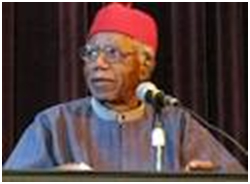Chinua Achebe
Famed writer and educator Chinua Achebe was born on November 16, 1930, in the Igbo town of Ogidi in eastern Nigeria. After becoming educated in English at the University of Ibadan and a undertaking a subsequent teaching stint, in 1961 Achebe joined the Nigerian Broadcasting Corporation as director of external broadcasting. He served in the esteemed position until 1966.
In 1958, Achebe published his first and arguably most acclaimed novel: “Things Fall Apart”. The groundbreaking book centers on the cultural clash between native African culture, and the traditional white culture of missionaries and the colonial government in place in Nigeria at the time. An unflinching look at discord, the book was a startling success and has become required reading in many schools across the world.
The 1960s proved to be a very creatively fertile period for Achebe. It was during this time period that he wrote the novels “No Longer at Ease”, “Arrow of God” and “A Man of the People”, all of which address the issue of traditional ways of life coming into conflict with new, often colonial, points of view.

In a related pursuit, in 1967, Chinua Achebe and Christopher Okigbo, a popular and renowned poet, co-founded a publishing company, the Citadel Press, which they intended to run as an outlet for a new kind of African-oriented children's books. Unfortunately Okigbo was soon killed, in the Nigerian civil war. Two years later, Achebe toured the United States with Gabriel Okara and Cyprian Ekwensi, fellow writers, giving lectures at various universities. The 1960s also marked Achebe's wedding to Christie Chinwe Okoli in 1961, and they went on to have four children.
When he returned to Nigeria from the United States, Achebe became a research fellow and later a professor of English (1976–81) at the University of Nigeria.
On the writing front, the 1970s proved equally productive, and Achebe published several collections of short stories and a children's book: How the Leopard Got His Claws. Also released around this time was the poetry collections Beware, Soul-Brother and Christmas in Biafra, and Morning Yet on Creation.

The 1990s began with tragedy: Achebe was in a car accident in Nigeria that left him paralyzed from the waist down and would confine him to a wheelchair for the rest of his life. Soon after, he moved to the United States and taught at Bard College, where he remained for 15 years. In 2009, Achebe left Bard to join the faculty of Brown University in Providence, Rhode Island, serving as professor of Africana Studies.
Chinua Achebe won several awards over the course of his writing career, including the Man Booker International Prize (2007) and the Dorothy and Lillian Gish Prize (2010). He also received honorary degrees from more than 30 universities around the world.
Chinua Achebe died on March 21, 2013, at the age of 82, in Boston, Massachusetts.
By Milica Matic

